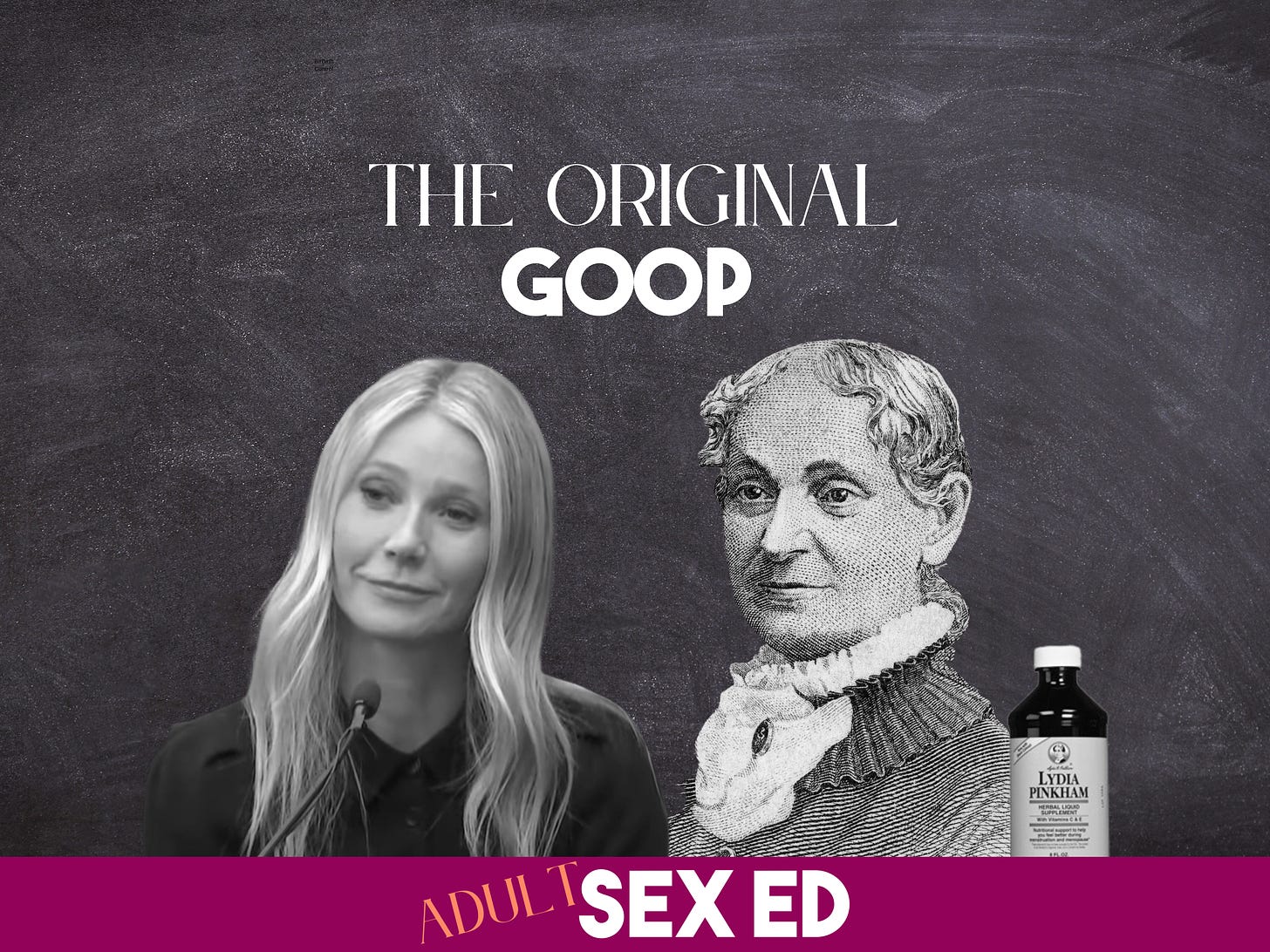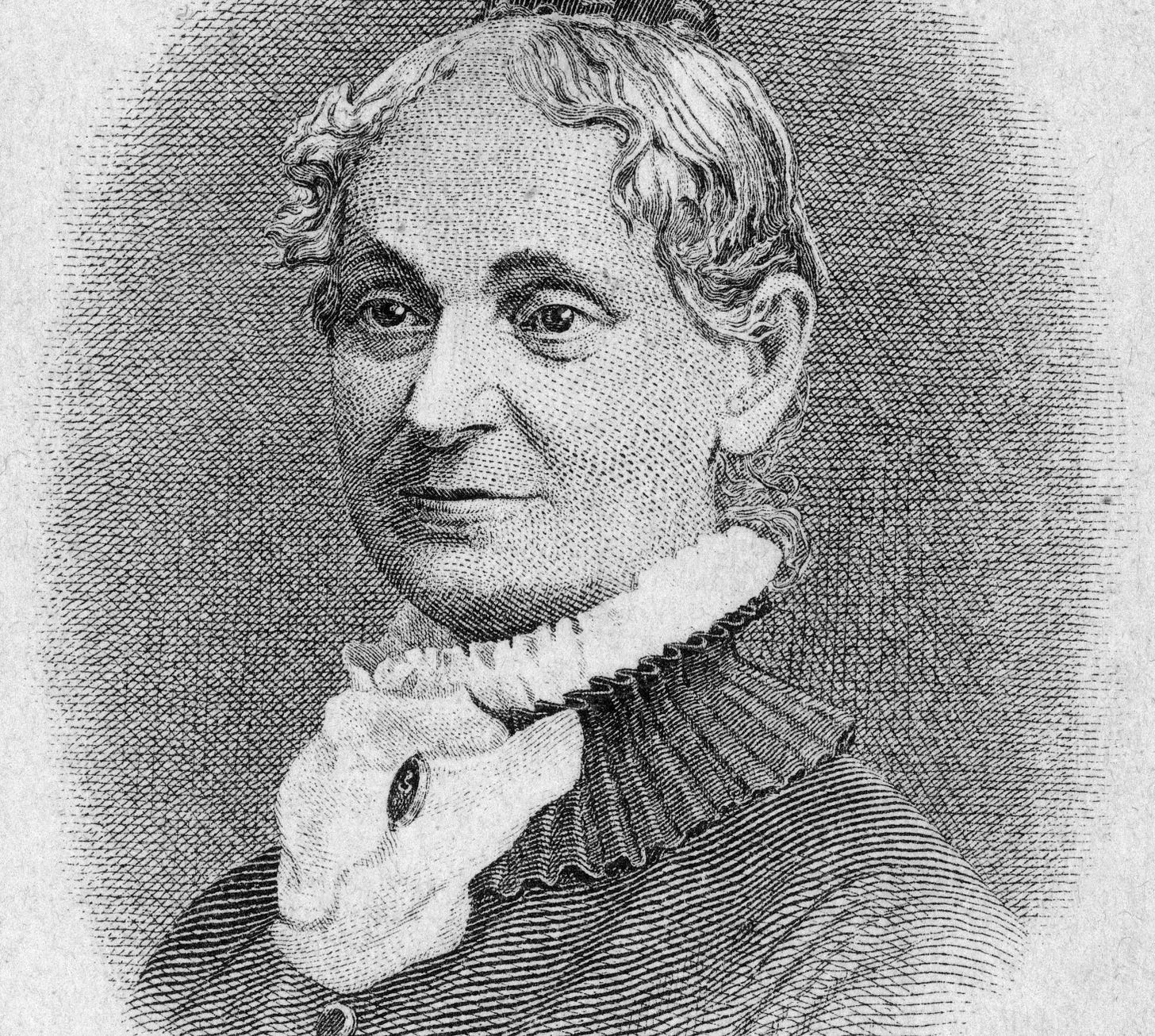PAVING THE WAY: the sexual health snake-oil saleswoman before Goop
She had the cure for all of your ailments, even if your womb fell out.
Hi Everyone,
Happy hump day and thanks so much for reading the ADULT SEX ED newsletter!
This is a weekly newsletter from me, Dani Faith Leonard (Follow me on instagram or twitter). It’s an extension of the live comedy show ADULT SEX ED that I’ve hosted since 2018. The show is about plugging the holes in our education as adults, so I’ll be doing just that (if you want to know more about this newsletter, here’s a description on substack).
Ready to get a little smarter? Okay, let’s go!
Dani
PS - If you were already subscribed to my personal newsletter, I’ve migrated everything related to ADULT SEX ED over here. I’m really excited to write some funny educational deep dives for you all!
THE ORIGINAL GWYNETH PALTROW
Gwyneth Paltrow’s wild ski accident trial came to a close last week when she was awarded $1 for her troubles. I couldn’t help but think about the boost that GP’s company, Goop, has received throughout the strangely dramatic televised trial. While the trial isn’t relevant to ADULT SEX ED, Goop sure is.
In recent years, Paltrow has used her platform to promote vaginal steams, coffee enemas, jade eggs (which help you “harness the power of energy work, crystal healing, and a Kegel-like physical practice”), and diet cleanses that will have you running on fumes. Speaking of fumes, two weeks ago, Gwyneth spoke on a podcast about her results from rectal ozone therapy. I’m not a doctor, but many of them take issue with blowing ozone gas up your butthole. It’s also probably expensive, like Goop’s “This Smells Like My Vagina Candle.” Since I’m not a medical expert, I can’t really argue the efficacy of any of these treatments—vaginal steaming has been around for centuries in other cultures—but the marketing is fascinating.
What if I told you there was an original snake-oil saleswoman, who revolutionized marketing and set the stage for the likes of GOOP and Dr.Oz? Her name was Lydia E. Pinkham (1819-1883) and researching her life was a complete joy. I first researched this problematic, but hilarious business genius for a show called Nevertheless She Existed, hosted by Kylie Holloway and Molly Gaebe, and then spoke about her at a live Adult Sex Ed show in March 2020.
Lydia E. Pinkham was born into a family of strongly abolitionist and anti-segregation Quakers in Lynn, Massachusetts. Frederick Douglass was a neighbor and a family friend. Lydia worked as a schoolteacher before getting married to a husband who never found his own financial success.
In the 1800s, the reputation of the medical profession was very low. Medical fees were too expensive for most Americans to afford except in emergencies. Sound familiar? Many preferred to trust unlicensed "root and herb" practitioners, and especially women who were prepared to share their domestic remedies. Like many women of her time, Pinkham brewed herbal potions for ailments.
Her remedy for "female complaints" became very popular among her neighbors to whom she gave it away for free at first, like a sucker. Lydia would claim that her feminine compound cured headaches, constipation, menopause, insomnia, depression, cancer, tumors, women's diseases, flatulence, menstruation, and fertility. By the early 1870s, the Pinkhams had been ruined financially and in 1875, the idea of making a family business of the remedy was formed.
So, what’s in this magic compound: The original recipe, created by Pinkham on her home kitchen stove, contained black cohosh, life root, unicorn root, pleurisy root, and fenugreek seed. The unicorn root allegedly gave energy to the uterus, like Jason Momoa. The pleurisy root allegedly helped cure a prolapsed uterus, which I’m sure is completely legit. Black cohosh is still used today to treat symptoms of menopause. Most importantly, her elixir contained 20% drinking alcohol, which solves literally anything.
Mass marketed from 1876 on, Lydia E. Pinkham's Vegetable Compound became one of the best known patent medicines of the 19th century. Sure, the medicine was special. But what was really extraordinary about Lydia E. Pinkham was her flair for marketing.
From the start, her product was marketed as for women, by women (FWBW?). One of her sons recommended that she use her face on the packaging, so the company made history as the first to ever use a woman’s likeness in advertising. That sounds crazy, but even the women’s products at the time were created by men. Since Lydia’s was the first face on an advertisement, she was also the first to be trolled. She was inundated with body-shaming hate mail slamming her 'cast-iron smile' and 'nightmare face.' But Lydia was laughing all the way to the bank.
Lydia established herself as Ann Landers meets Doctor Ruth and declared herself the “savior of her sex” in advice packets she created and published, which were innovative in their frank sex ed advice and use of testimonials.
Lydia’s advice packets explained menstruation and childbirth in very frank terms. Some of her advice packets were health related, but she also released cookbooks and advice on finances and relationships. While the information was revolutionary, the pamphlets contained tons of misinformation and were filled with sexist tropes in line with the times. No matter what your personal ailment, the cure was always “Lydia E. Pinkham’s Vegetable compound.”
Lydia’s “medical” textbook, A Private Textbook on Ailments Peculiar to Women was the first of its kind to be given out for free. The book starts by explaining menstruation, motherhood, and menopause. But halfway through the book, Lydia explains some of the other ailments that a woman might have. Is your womb falling out of your body? She has the cure. It’s Lydia E. Pinkham’s Vegetable Compound. Strange discharge? Drink the compound. Have a tumor? Definitely the vegetable compound. Are you hysterical or psychotic? Drink up!
Her use of testimonials in her pamphlets was legendary. Women were urged to write to Mrs. Pinkham and she corresponded with many. My favorite testimonial was in between recipes in Lydia’s cook book:
AS IF I MUST SCREAM. I was a nervous wreck and I just had to force myself to do my work. Even the sound of my own children playing made me feel as if I must scream if they did not get away from me. I could not even speak right to my husband. The doctor said that he could do nothing for me owing to my condition. My husband's grandmother advised me to take Lydia E. Pinkham's Vegetable Compound. I was able to do my work once more, and it was a pleasure, not a burden. MRS. EMILY DAVIS
Well, since the dosage is once every four hours, Mrs. Davis was shitfaced!
Women continued to write and receive answers to questions for decades after Pinkham's own death. In 1905, the Ladies' Home Journal published a photograph of Lydia Pinkham's tombstone and exposed the ruse.
In the years following Lydia’s success, companies that made menstrual pads and tampons published booklets for pubescent girls that promoted their own products. Lydia’s marketing tactics are still used today by self help gurus, TV doctors and other health and wellness professionals who have something to sell.
Though most of the medical claims were crazy ridiculous, Lydia E. Pinkham’s vegetable compound is still available today at a Walmart near you. It’s been modified from the original version and it won’t get you shitfaced when you’re on your period, but some of the herbs in the compound are recognized by health practitioners and experts in natural medicine to relieve the symptoms associated with menopause and menstruation. There’s a nugget of truth in every scam!
One hundred years before Dr. Oz was slammed for promoting weight loss products and sued for making factually deficient claims about olive oil, Lydia Pinkham created the framework for a bullshit TV doctor! She will go down in history as a marketing genius so legendary that she was memorialized in a folk song called The Ballad of Lydia Pinkham. During the Prohibition era, the medicine had a particular appeal as a readily available 40-proof alcoholic drink, and it is likely that this aided the song’s popularity.
Then, in 1968, the song was reimagined as a drinking song called Lily the Pink, which was recorded and released by the UK comedy group The Scaffold, and it reached No. 1 on the UK Singles Chart. Backing vocalists on the recording included Graham Nash, Elton John (then Reg Dwight), and Tim Rice; while Jack Bruce (of Cream) played the bass guitar. Lydia would have been so proud. Or just drunk.
NEWS
In April, I’m bringing some Adult Sex Ed to Houston, TX, where I’m performing at the Healthy Futures of TX conference. Then, I’ll be on the West Coast.
Want an Adult Sex Ed live show in your city? Let me know by responding to this email or leave a comment!
Why am I getting this? If you were already subscribed to my personal newsletter, I’ve migrated everything related to ADULT SEX ED over here. Feel free to unsubscribe if it’s not for you! If it is for you, please share with friends.







